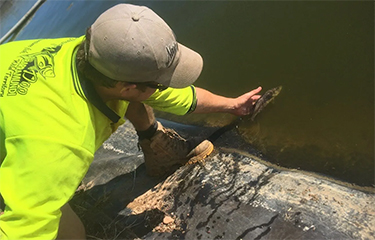Humpty Doo Barramundi – a barramundi aquaculture company based in Middle Point, Australia, along the Adelaide River in Australia's Northern Territory – is completing a trial batch of black jewfish in what it is deeming a world-first for aquaculture.
Black jewfish, also called mulloway or black spotted croaker, are a fish local to the region. According to the company, the species is a good-tasting fish that can get up to 45 kilograms in weight.
Humpty Doo Barramundi is sourcing its black jewfish fingerlings from the Darwin Aquaculture Centre, a research and development center designed to support the region’s aquaculture operations. Aquaculture researcher Andrea Taylor has been spawning the species at the center since 2018.
The black jewfish being transfered into Humpty Doo's grow-out ponds weigh 300 grams. The company said it expects them to reach a harvest weight in about two years.
Humpty Doo Fish Production Manager Jason Clark told the Australian Broadcasting Corporation the fish were only recently moved into its facilities.
“We’ve just shifted them into a cage, which is inside one of our ponds, and they’re growing very nicely,” he said.
Black jewfish present a few challenges distinct from barramundi. Because they have different feeding habits and anatomies, it took longer to figure out the proper aquafeed, Clark said.
“We’re learning, too, though, because as far as we know, this hasn’t been done with this species anywhere in the world,” he told ABC News.
The fish also has a propensity toward cannibalism.
“We see a fair bit of tail-biting cannibalism in the late-larval and early-juvenile phases, especially if they’re held in a high stocking density,” she said. “So, we think a low stocking density could be a way to reduce that, but we’ve got trials going now.”
Humpty Doo said its efforts are very much a trial run and it doesn’t expect to do commercial harvesting any time soon.
“As the species has never been farmed before, there is a lot to learn about how the fish like to eat, grow, and live before they can be farmed in any quantity,” the company said.
Photo courtesy of Humpty Doo Barramundi







